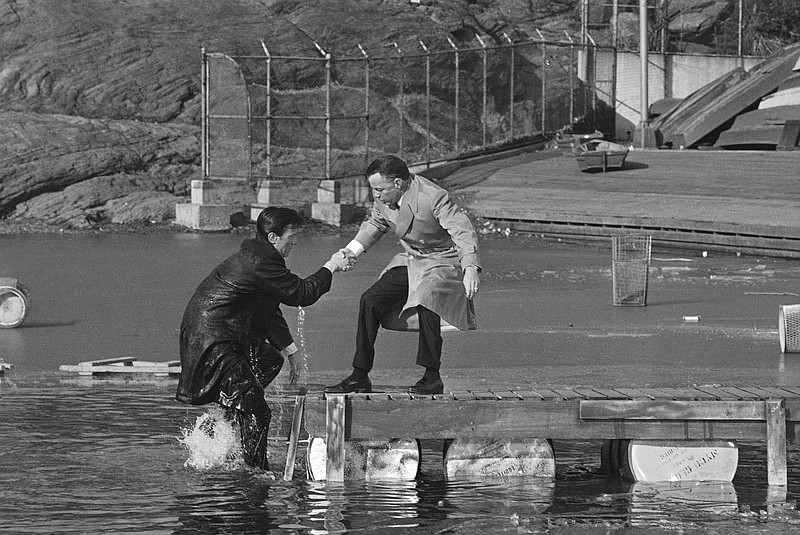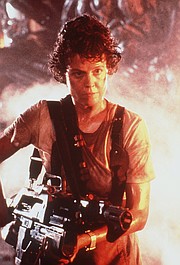Great political stories are about power - how it's used, abused, who has it, who doesn't, what the players do to get it and how those rare few with angelic hearts and streetfighter instincts wield it with genius and compassion.
Those stories are as dramatic as any horror movie and sometimes a lot more shocking. Admit it, the moment in the Season 2 premiere of "Fargo" on FX when a gunman walked into a snowbound silver diner where a customer sips a vanilla shake, a massacre was utterly predictable because the director wanted the eye candy of red blood swirling into whiteness.
In these thrillers - some films, some TV shows - power is wielded so cleverly that when innocents die, the guilty are nowhere near smoking guns. Audiences gasp in surprise when someone dies.
With the presidential election season in full swing - a full year from actual Election Day (arrgh) - we thought it would be interesting to take a look at some of the political films in history, see what made them stand out, delve deeply into their underlying messages.
Some of the names may surprise you because, on the surface, they don't seem political at all, yet their directors and writers have said they are metaphors for political questions or comments that were rolling around in their minds.
This list can be enjoyed by all political affiliations. These classics feel as urgent and sharp today as the year they debuted.
12) "A Face in the Crowd" (1957)
Political junkies speculate that Rush Limbaugh patterned his persona after national radio sensation Lonesome Roads, a hard-drinking babe-hound with a gift for selling everything from mattresses to all-sugar "energy pills" and played - of all people - by Andy Griffith, three years before he would become the father everyone wanted on "The Andy Griffith Show."
Roads decides to be a political kingmaker and starts pitching candidates. As he grows richer and his ego bigger, his staffers worry but not enough to jump off a gravy train with biscuit wheels. This smart, cynical story foreshadows the nebulous yet ferocious power of social media.
11) "Dr. Strangelove or: How I Learned to Stop Worrying and Love the Bomb" (1964)
Convinced that Commies tampered with Americans' "precious bodily fluids' via fluoridated water, a crazed Air Force general (who's actually suffering from erectile dysfunction) launches U.S. nuclear weapons at Russia. This satire by director Stanley Kubrick ("2001: A Space Odyssey," "The Shining," "A Clockwork Orange") offers a pre-cellphone argument between Col. "Bat" Guano and Capt. Lionel Mandrake when Guano refuses to shoot a Coke machine to get quarters for Mandrake, who needs the coins so he can use a pay phone to warn the White House of the apocalypse. A head's up: "Dr. Strangelove" does not end on a happy note - but who would expect it to?
10) "Z" (1969)
This French film, directed by Costa-Gravas, was a hit in the U.S. A military dictator disguises the assassination of a leftist rival as a car accident. A conservative prosecutor is appointed and expected to close the case without investigation. But behind the prosecutor's boring persona is an honorable man determined to find and document the truth. The stunning surprise ending is fact-based.
9) "Chinatown" (1974)
Directed by Roman Polanski, this mystery involves private eye Jack Nicholson, a beautiful blonde, a vicious real estate baron and secret deals over which Southern California towns will get water, a resource so precious an honest government official is murdered when he discovers a corrupt deal. California's current drought makes this film noir even more timely, while the tale of how easily wealthy, amoral power can elude any system of justice makes it timeless. The film's classic final line is spoken by someone gazing into the heart of utter evil.
8) "Aliens" (1986)
The sequel to "Alien" might seem like a straight space-horror film, but director James Cameron says it was shaped by debates over whether America should fight wars to protect oil companies. The action is also haunted by President Dwight Eisenhower's prophetic farewell speech, when he warned the day would come when military and Wall Street global financial interests were so mixed, Americans would tumble into endless wars. In "Aliens," Weyland-Yutani (a powerful company with Halliburton-sized wealth) colonizes a remote planet, but the colony suddenly falls silent. Ellen Ripley (the only survivor from the original "Alien") is sent along with a squad of Marines to find out what happened; she warns them that monsters from the planet massacred her crew long ago. The Marines don't know that Weyland-Yutani wants to subdue and weaponize the monsters. Naturally, the monsters couldn't care less what the company wants and have plans of their own.
7) "The Lives of Others" (2006)
The dumpy Cold War spy in this film is no James Bond. Hookers are his only female companions. The brutal East German secret police, the Stasi, assign him to spy on a pair of lovers - dashing playwright Georg and beautiful actress Christa-Marie. The task is to find a reason for the Stasi to arrest, kill or destroy the pair. But peering into their lives, the spy is dazzled by the couple's courage and passion for each other and their art. He finds small ways to protect the lovers. Then the Stasi forces him to make a cosmic decision.
6) "House of Cards" (U.S. version 2013-15)
This Netflix series grasps how Twitter, blogs and social media shifted power dynamics in the Washington, D.C. press corps. The Washington Post and New York Times can sway public opinion, but the shrewdest "Cards" players know a well-placed leak to the right blogger can make a hero out of a zero or end an enemy's career with 140 characters worth of ridicule.
5) "House of Cards" (British version, 1990-96)
Conservative politician Francis Urquhart is far more terrifying than his American counterpart. The action is faster, the dialogue more acidic in the British version of the show. Urquhart concocts a fake financial scandal to get rid of his Prime Minister then reminds himself to "crush any pangs of pity under the foot like cigar butts." The PM wanted to be liked, Urquhart notes, a harmless flaw in "a spaniel puppy or a whore" but fatal in power struggles.
4) "Fail Safe" (1964)
U.S. military jets scramble when a Russian bomber seems to intrude into U.S. airspace. Then the plane is identified as an off-course commercial airliner. All U.S. jets get the message that the alert was an error - except one. The thriller illuminates the price honorable men and women pay for a nation. One sound from the movie you will never forget is the screeching made when the plastic and metal of an ambassador's phone melts during a nuclear explosion.
3) "King" (1978)
The 1978 TV miniseries about Martin Luther King, starring Paul Winfield and Cicely Tyson, stirred controversy for honestly depicting King's struggles within the civil rights movement and with two presidents. Watch Attorney General Robert Kennedy confront FBI Director J. Edgar Hoover (who so despised King he ordered anonymous letters sent to King urging him to commit suicide). Kennedy demands to know why FBI agents can't stop rioters from beating civil rights activists to death. Hoover's menacing, icy response begins, "No president ever spoke to me like that, much less a mere AG."
2) "West Wing" (1999-2006)
Two episodes of this NBC show have tick-tock plot twists that qualify as thrillers. "In This White House" from 2000 has a beautifully crafted script about a liberal president trying to hire conservative lawyer Ainsley Hayes because he admires her intellect and ethics. She wants to decline. Also at the White House is the dedicated African leader of a nation ravaged by HIV, pleading with pharmaceutical CEOs for an affordable cure. What happens next - well - just get ready to sob idealistic tears. "Two Cathedrals" from 2001 encompasses a good president fighting God, whom he calls a "feckless thug," as a hurricane rapidly approaches.
The last word goes to Ainsley Hayes of "The West Wing" who (spoiler alert) recites her disagreements with White House staffers then adds: "Don't call them worthless The people that I have met have been extraordinarily qualified; their intent is good. Their commitment is true; they are righteous; and they are patriots. And I'm their lawyer."
1) "The Manchurian Candidate" (1962)
Stick with the original, not the 2004 remake, and enjoy a nail-biting climax, one of the grossest kisses in movie history and sharp, bitter wit. Though deemed a boob by his own party, Sen. John Iselin is his party's vice presidential candidate. A direct jab at U.S. Sen. Joe McCarthy, Iselin gains fame claiming there are Communists in the U.S. government. When he complains that reporters mock him for constantly changing the number of alleged Commies, his wife glances at the Heinz 57 bottle he's holding and tells him to stick with 57.
The "candidate" is a good man who was brainwashed by North Koreans to become an assassin. The film offers the provocative premise that extremists on the right and left have a lot in common because all they truly care about is their own global power.
Contact Lynda Edwards at ledwards@timesfreepress.com or 423-757-6391.

